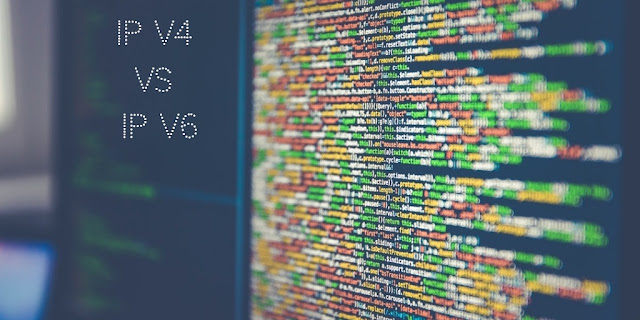Differences IPv4 Vs IPv6
Thanks to those known and known sources who helped me compile this.
IPv4
|
IPv6
|
| IPv4 addresses are 32 bits (4 bytes) in length. | IPv6 addresses are 128 bits (16 bytes) in length. |
| IPv4 addresses are numeric and typically written in decimal digits. | IPv6 addresses are alphanumeric in nature and typically written in hexadecimal. |
| IPv4 addresses are divided into four 8-bits blocks. | IPv6 addresses are divided into eight 16-bits blocks. |
| IPv4 address 8-bit blocks are separated by a dot (.) symbol. | IPv4 address 8-bit blocks are separated by a colon (:) symbol |
| IPv4 has five different IP address classes namely, Class A, Class B, Class C, Class D, and Class E. | IPv6 does not have any IP address classes. |
| IPv4 address types include Unicast, Multicast, and Broadcast. | IPv6 address types include Unicast, Multicast, and Anycast |
| IPv4 address space spans up to 4 billion unique IP addresses. | IPv6 address space spans up to 340 undecillion unique IP addresses. |
| IPv4 addressing supports Virtual Length Subnet Masking (VLSM) | IPv6 does not support VLSM |
| In DNS, IPv4 uses Address (A) resource records to map hostnames to IPv4 addresses. | In DNS, IPv6 uses Address (AAAA) resource records to map hostnames to IPv6 addresses. |
| In DNS, IPv4 uses Pointer (PTR) resource records in the IN-ADDR.ARPA DNS domain to map IPv4 addresses to hostnames. | In DNS, IPv6 uses Pointer (PTR) resource records in the IP6.ARPA DNS domain to map IPv6 addresses to hostnames. |
| In IPv4, IPSec is optional and should be supported externally. | In IPv6, IPSec support is not optional and it is mandatory. |
| IPv4 Header does not identify packet flow for QoS handling by routers | IPv6 Header contains the Flow Label field, which Identifies packet flow for QoS handling by the router. Thus IPv6 provides efficient QoS. |
| In IPv4, both routers and the sending host fragment packets. | With IPv6, routers do not support packet fragmentation. Only sending host fragments packets in IPv6. |
| IPv4 header includes a checksum. | IPv6 header does not include a checksum. |
| The header includes options. | Optional data is supported as extension headers. |
| In IPv4, ARP uses broadcast ARP requests to resolve IP to MAC/Hardware address. | In IPv6, Multicast Neighbor Solicitation messages resolve IP addresses to MAC addresses. |
| In IPv4, Internet Group Management Protocol (IGMP) manages membership in local subnet groups. | In IPv6, Multicast Listener Discovery (MLD) messages manage membership in local subnet groups. |
| IPv4 uses Broadcast addresses are used to send traffic to all nodes on a subnet. | IPv6 uses a link-local scope all-nodes multicast address. |
| IPv4 address can be configured either manually or through DHCP. | IPv6 does not require manual configuration or DHCP. |
| In IPv4, packet size must be 576-byte packet size (possibly fragmented). | In IPv6, packet size must support a 1280-byte packet size (without fragmentation). |
Network Sorcery is a great place to find RFC(s).
Refer to http://www.networksorcery.com/enp/protocol/ipv6.htm and http://www.networksorcery.com/enp/protocol/ip.htm links for related RFC(s) of IPv6 and IPv4 respectively.
Also, there is a good reference for Understanding IPv6 @ http://technet.microsoft.com/en-us/library/cc786127.aspx
Never miss an update. Subscribe and follow to stay informed. Delivered Every Tuesday.
We hate spam too, we will never share your details.

Mandar Pise
Opinions expressed by techsutram contributors are their own. More details
Mandar is a seasoned software professional for more than a decade. He is Cloud, AI, IoT, Blockchain and Fintech enthusiast. He writes to benefit others from his experiences. His overall goal is to help people learn about the Cloud, AI, IoT, Blockchain and Fintech and the effects they will have economically and socially in the future.
Weekly Newsletter
Never miss an update. Subscribe and follow to stay informed.
Delivered Every Tuesday.
Delivered Every Tuesday.
Thank you! You have successfully subscribed to our newsletter.
We hate spam too, we will never share your details.






thank you
ReplyDeleteNice comparision i m wasim from pakistan
ReplyDeletethank u...........such a nice comparision..
ReplyDeletenice difference........
DeleteThanks. This is very useful.
ReplyDeleteTHANK U BUT GIVE MORE INFO
ReplyDeleteTx. more info is highly appreciated. hw ever very helpful.
ReplyDeletethis is very good ....but i need the diff between RMI AND RFC
ReplyDeletethnx.very useful for me thnx once again.pls give some vlan concept question from lenin chennai
ReplyDeleteGood-quick reference. Thanks
ReplyDeletehey its a nice reference. Thanks
ReplyDeletereally helped me for my quiz thanks a lot
ReplyDeletethanx really very nice
ReplyDeletethanx sir...........divesh agrahari
ReplyDeleteya its really good and very helpful thank you so much ...:)
ReplyDeleteit was of great help.. thank yu..
ReplyDeletei suggest to keep in touch with an ipv4 to ipv6 discussion forum since it often gets full of expertise and good answers
ReplyDeletehello great...
ReplyDeletehey thanx for giving this ....
ReplyDeletewell can u tell me which is best ipv6 or ipv4
ReplyDeletethanks d(^_^)b
ReplyDeletegud 1 thanx...........
ReplyDeletetank you sir I ajith from kerala
ReplyDeletethere's one mistake in first point....it shud b 6 bytes..
ReplyDeleteThanks:) Really useful one.. Good job..
ReplyDeleteThis is really nice..
ReplyDeleteThankz alot :)
I like your Blog.
ReplyDeletesatyam from india
thanks sir & I like your blog
ReplyDeleteimage only:
ReplyDeletehttps://docs.google.com/document/d/1IN43WKZQbETdkGLvdDSTCrMMk4F3Xb4LJqUcCoMMsAU/edit
Very helpful. Thanks so much
ReplyDeletethanx and i like ur blog
ReplyDeleteOhhh really hlpful...thnxx
ReplyDeletethanx..
ReplyDeleteThanx for u r blogs... jus referred u r blogs instead of books during exams...
ReplyDeleteThis comment has been removed by the author.
ReplyDeleteThanx
ReplyDeleteThanks for helpin fo my cn 2 xam..
ReplyDeletemany thanks.. just pop to me in google when i search for ipv4 vs ipv6 which is what i need to know..
ReplyDeleteuseful table
Very nice
ReplyDeletei need difference between ip4 &ip5
ReplyDeletei need difference between ipv4 nd ipv6
ReplyDeletethanx
ReplyDeletevery nice and thanks..
ReplyDeletenice different
ReplyDeleteThank you, you are a life-saver. Required this for my assignment.
ReplyDeleteI have been receiving abusive comments.
ReplyDeleteConsidering nature of the content it is quite possible that there are few new improvements or additions over period of time (this article is from year 2009), please consider adding to the contents even it means pointing out few mistakes or new additions. Posting abusive comments neither does justice to the contents of this post nor to me as an author.
thnx not getting this in any other tutorials.
ReplyDeletethnx fr giving detail & point to point difference..
beautiful comparison thanks a lot
ReplyDeletebeautiful comparison between ipv4 and ipv6 great job
ReplyDeleterealy great
ReplyDeleteThanks a lot. This really helped me with my TCP/IP class unit on IPv6.
ReplyDeleteThanks a lot nice answer
ReplyDelete